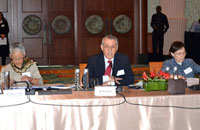 Dr Ala Alwan, WHO Regional Director for the Eastern Mediterranean, addressing the meeting during the first session
Dr Ala Alwan, WHO Regional Director for the Eastern Mediterranean, addressing the meeting during the first session
»Meeting full documentation30 January 2013, Dubai – Delegates at a United Nations-convened high-level meeting on saving the lives of mothers and children in the Eastern Mediterranean Region today agreed to urgently accelerate progress on improving maternal and child health between now and the end of 2015. They also committed to reduce the gap between current funding levels and those required if the Region is to meet Millennium Development Goals 4 and 5 on reducing maternal and child mortality.
The commitments are laid out in the Dubai Declaration, “Saving lives, Rising to the Challenge”, which details seven key concrete actions to be taken by all countries in the Region to enable more women and children to access the health services they need.
Countries agreed to develop and execute national plans for maternal and child health; to take measurable steps to strengthen their health systems; to mobilize domestic and international resources to establish sustainable financing mechanisms.
They also agreed to improve coordination and accountability between all partners and promote cooperation between countries within the Region; to address social and environmental determinants of maternal and child health, such as poverty, gender, water and sanitation, nutrition and education, and to monitor progress through a regional commission on women’s, adolescents’ and children’s health.
"WHO, UNICEF and the United Nations Population Fund will work together across the Region to support countries in taking these commitments forward,” said Dr Ala Alwan, Regional Director for the WHO Eastern Mediterranean Region, on behalf of the three agencies co-organizing the meeting. “This is the start of something new and important. As the Declaration emphasizes we are determined to do our utmost to ensure that every woman has the best opportunity for a safe delivery, so that every child has the best possible start in life.”
Making individual commitments on the final day of the meeting, countries not only pledged to take action at home, but reiterated the importance of demonstrating solidarity within the Region, and sharing experiences. Many highlighted the wide diversity in resources and capacity that exists between countries. Some pointed to ongoing initiatives under which richer countries partner with poorer ones, including through technical assistance on the ground. Countries that had already received assistance, pledged, in turn, to support others.


